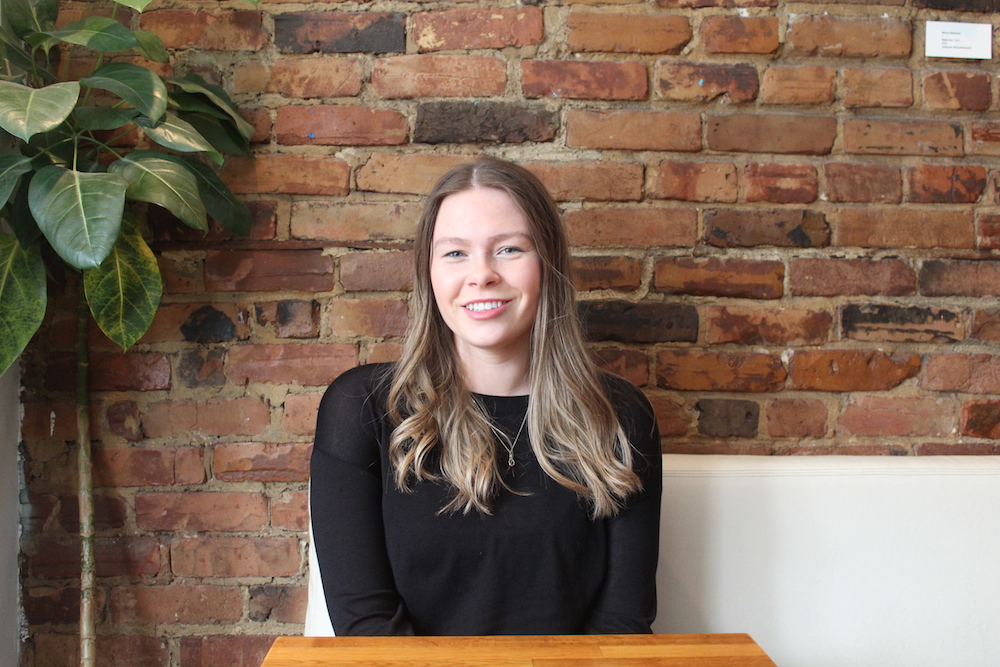If elected, Marguerite Rolland plans to provide students with co-curricular opportunities
At her core, Marguerite Rolland is an organizer. From planning out every detail of her cottage trips with friends, to her work as president of the Concordia Linguistics Student Association (LSA), she prides herself on her knack for structure and efficiency.
When she isn’t up to her ears in her latest spreadsheet, Rolland spends her time engaging in student life at Concordia in every possible way. Apart from her work with the LSA, she is also a student advocate at the Concordia Student Union (CSU) Advocacy Centre and an undergraduate research assistant for the linguistics department.
“My whole first year, I was very involved in the LSA, and then this year I wanted to branch out a little bit more, so I started joining ASFA committees,” Rolland told The Concordian.
In this month’s ASFA elections, she is running for advocacy and executive coordinator as part of a team called Fill In The Blanks—a name that reflects the team’s desire to “provide students with experiences and opportunities that supplement their academics at Concordia,” according to Rolland.
Along with her teammates Fatima El Gahami, Bakry Alsaieq, Elliott Boulanger and Manal Alsaieq, Rolland said she is trying to figure out “what’s wrong with ASFA, and what’s right with other faculty associations.” According to her, ASFA is not respected by the majority of the student body.
“In the past, they’ve been regarded as this sort of fratty, toxic, unprofessional association,” Rolland said. “ASFA isn’t really a resource for students in the same way that [other student associations are].”
Rolland’s main goal, if elected, is to change that reputation by transforming ASFA into a vehicle for student success.
“The one thing that unifies all Arts and Science students is that we all walk out of Concordia with a BA or a BSc,” she said. “Unfortunately, that alone is not worth very much anymore. Students graduating with these degrees need to stand out. They need something else on their CVs, like co-curricular activities, volunteer experience. […] I want ASFA to offer those things.”
One of the projects Rolland and her team have proposed is a volunteering series organized by ASFA, where students could sign up and have off-campus volunteering sessions organized and scheduled for them by the federation. According to Rolland, if the idea is approved, participating students would be able to complete a full day of volunteering once a month with a specific organization or charity. After eight sessions, students could be granted recognition for participating in the volunteering program by having it included on their co-curricular record.
“You would be able to choose what type of volunteering works for you and build connections that way,” she said. “It’d be accessible to students because they wouldn’t have to go out and find organizations themselves. They wouldn’t have to schedule it or set it up and they wouldn’t even have to go every week.”
Rolland and her team also hope to bring forward other projects, such as implementing an online voting system and providing workshops or seminars on things like coding or graphic design—useful skills students would then be able to list on their CV.
Another issue the team hopes to highlight is the current lack of mandatory office hours for ASFA executives. She said she believes that implementing mandatory office hours would encourage students to come into the office, speak with executives, ask for help and suggest their own ideas.
“I think it’s important to show students that we’re not just here to plan frosh, host random parties or give out random amounts of money to the [Member Associations (MAs)], but rather, that we’re actually trying to do something,” Rolland said. “We’re trying to go somewhere and we’re trying to do it in a way that makes people want to get involved.”
Currently, MAs can apply to to receive funds from ASFA to host various events. Rolland said she hopes to “cut that [Special Project Fund (SPF)] in half and have a specific SPF that’s designated for academic experience.” The Academic SPF would fund MAs that wish to host academic activities, such as conferences.
When asked what differentiates her from the other ASFA candidates, Rolland said she draws on her experiences working with the LSA and the Student Advocacy Centre.
“I know how to work in a team, and I know how to ask the right questions,” she said. “I feel like I’m very aware of what’s happening in the school and what students are not happy with, so I have a really well-rounded sense of what is wrong and what needs to be fixed.”
Overall, Rolland said her main goal is to accurately represent Arts and Science students, as well as bringing ASFA back to its original purpose—providing students with things their academics aren’t giving them.
“I’m not a politician; I’m an organizer,” she said. “I think it’s important to represent your students and what they believe, but I think, at the same time, ASFA is primarily a resource. I would like to bring it back down to being a resource first and foremost and make sure it has a good foundation.”
Rolland said that, even if she isn’t elected, she still wants to see the initiatives she cares about put forward.
“I’m anti-apathy,” she said. “At the end of the day, it’s not about who’s doing it, it’s about getting it done.”
Photo by Alex Hutchins




